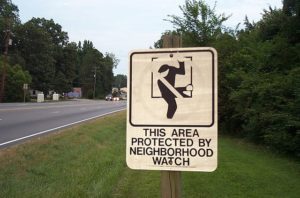One of the most often overlooked things a person can do to protect their home and family from crime and break-ins is to become active participants in a neighborhood watch program.
Neighborhood watch programs encourage residents within a defined area to look for and report suspicious activities to the police.
It’s a really simple concept…neighbors helping neighbors stay safe.
The big goal is to deter criminals from preventing a crime. Many neighborhood watch programs also encourage homeowners to get home safety inspections, upgrade locks and improve outdoor lighting. They’ll hold regular neighborhood meetings and they’ll establish phone trees and notification networks like Nextdoor for quick neighborhood alerts.
There are huge proactive steps neighborhood watch groups undertake in promoting the program throughout the community. They’ll make sure proper signage is in place, and provide residents with stickers to place on doors and windows as added protection. They’ll work with community developers for adequate door and window locks and outdoor lighting on new properties. They might even contact a local monitoring company.
Study after study proves that neighborhood watch programs are quite effective at preventing crime and capturing criminals. A U.S. Department of Justice study found that neighborhood watch programs – also referred to as block watch, home watch and community watch – cut crime by anywhere from 16% to 26%!
To find out if there is a neighborhood watch group in your community, contact your local police department or sheriff’s office. And if you are interested in starting a neighborhood watch group in your area, take these steps:
- Form a small committee of interest people in your neighborhood. You can meet to determine neighborhood needs and levels of interest. Think about the size (number of homes) and area (geographic distance) of your watch – keep things to a manageable number.
- Contact the neighborhood watch coordinator at your law enforcement agency. They’ll help you organize two informational meetings to get things started.
- Invite as many people as possible to the informational meeting. It will help educate and inspire people to participate in the program.
- The neighborhood watch coordinator from the police department will plan and conduct the first two meetings. They show videos, explain the problems and explain the dos and don’ts of the program. They’re trained experts at providing informative and entertaining meetings helpful to your community.
- After the initial two meetings, homeowners take over. They’re given guidance about content for future community meetings and instruction about how to maximize the impact of the program in their neighborhood.
It’s holiday season and it’s darker outside due to winter days. Criminal activity is on the rise. Do yourself and your neighbors a huge favor – become involved with a neighborhood watch program today!

